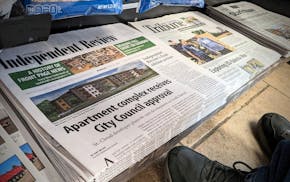In a career that spanned 50 years, Dr. John Shepherd conducted pioneering research in cardiovascular physiology, worked with NASA to ensure the health of astronauts, befriended Soviet colleagues who shared research despite Iron Curtain estrangements, and trained more than 100 research fellows at the Mayo Clinic in Rochester.
Working with him "was like being in a jam session with Duke Ellington and you didn't want it to ever stop," said Dr. Michael Joyner, one of his research fellows. "He had a 12-cylinder engine for a brain. He said that intelligence is a gift but that drive and energy is a bigger gift."
Shepherd, 92, who was Mayo's director of research from 1969 to 1976, died Oct. 4.
He was born in Northern Ireland, the youngest of four children of a Presbyterian minister and a high-energy mother who pushed him to excel, said his daughter, Dr. Gillian Shepherd Mestre. He attended boarding school, where, he would laughingly recall, he was caned more than once following run-ins with authorities, she said.
He received his medical degree from Queens University in Belfast, Northern Ireland, then completed an internship and residency at Royal Victoria Hospital in Belfast.
"He was fairly independent at an early age, and I think that fostered self-reliance and probably a curiosity about the world that he always maintained," his daughter said.
"This was his gift to us. We knew we always had his support, but he nudged us to spread our wings."
She described Shepherd's legacy as twofold: Individual contributions to understanding the control of blood pressure and what happens to the body in space, and the exponential effect of the legions of medical fellows he trained.
Joyner said Shepherd was an impeccable dresser whose appearance was deceiving. "He looked like the ultimate member of the establishment, but he was a rebel on the inside," Joyner said. "He declared war on conventional wisdom."
Never one for pretension, Shepherd would demand that his research fellows play it brutally straight with him, especially when he was preparing for an academic lecture.
"He demanded withering criticism from his underlings," Joyner said, and "wanted us to make him appear intellectually naked" so that he would be fully prepared for a presentation.
In the early 1960s, Shepherd was contacted by NASA because of his cardiovascular research. The space agency was concerned about the effects of weightlessness on astronauts. Shepherd joined NASA's space medicine team in 1965 and subsequently chaired the unit until 1974.
During meetings with Soviet space researchers, he would often be put in a position of celebrating some mutual agreement with a vodka toast. Wishing to avoid intoxication without appearing rude, he would pretend to drink his shot or substitute a drink from a flask the Soviets assumed contained vodka.
"He got his most joy when he saw the success of others," Joyner said.
Services will be held Oct. 22 at 11 a.m. at First Presbyterian Church in Rochester.
Paul McEnroe • 612-673-1745

In Grand Rapids, Itasca Pride is planning its first event, but there is already pushback
One person shot at YMCA in Coon Rapids

BCA says man pointed pistol-style BB gun at officers before he was shot in Woodbury

Former diversity worker sues University of Minnesota after firing over swastika photo

